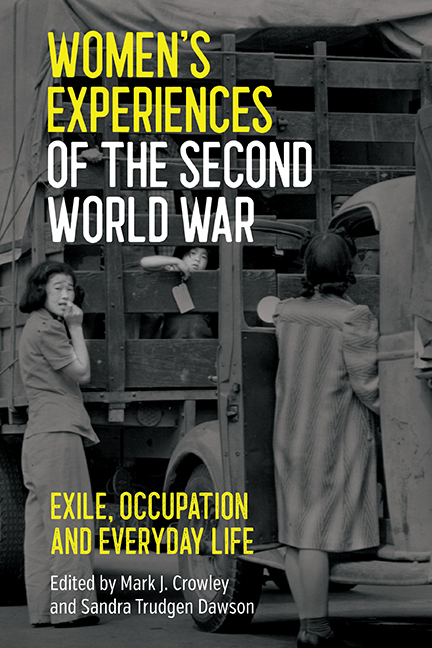Book contents
- Frontmatter
- Dedication
- Contents
- List of Illustrations
- List of Contributors
- Acknowledgements
- List of Abbreviations
- Introduction: Women’s Experiences of the Second World War: Exile, Occupation and Everyday Life
- Part One Living in Exile and under Wartime Occupation
- Part Two Living with Wartime Occupiers
- Part Three Everyday Life at Home and on the Battle Front
- Index
8 - Contradictions and Conformity in a Wartime Boarding House: Gender Roles and British Food Rationing in the Second World War
Published online by Cambridge University Press: 03 June 2021
- Frontmatter
- Dedication
- Contents
- List of Illustrations
- List of Contributors
- Acknowledgements
- List of Abbreviations
- Introduction: Women’s Experiences of the Second World War: Exile, Occupation and Everyday Life
- Part One Living in Exile and under Wartime Occupation
- Part Two Living with Wartime Occupiers
- Part Three Everyday Life at Home and on the Battle Front
- Index
Summary
In 1939, when the Second World War begun, Britain was ill- prepared for the requirements of total war. By December, military personnel only numbered 1,557,000 men and 43,100 women. However, these numbers swelled and fluctuated throughout the war. The women's auxiliary services peaked in September 1943 with 470,700 members, while the number of men in the armed forces reached its zenith with 4,653,000 soldiers by June 1945. Housing on military bases was insufficient to accommodate this great influx of men and women into the services, so military officials built more housing on bases and requisitioned private residences and boarding houses throughout Britain to combat shortages. Occupants and owners of requisitioned accommodation had little choice but to comply with orders to relocate, or to provide spare rooms for soldiers. In return, the military reimbursed boarding homeowners for their efforts.
The makeshift means of housing service personnel in privately owned accommodation set up alternative domestic environments. In these settings, the home and military fronts intersected. It created a diverse set of circumstances where gender roles were enacted through everyday activities in and around the home. This included the production and consumption of meals with food rations. Using food as a lens, this chapter examines the oral interview of Kathleen Gregory, a boarding house owner in Morecambe, England during the Second World War, to assess how gender roles were constructed among civilians and military personnel as they negotiated the food situation in this alternate domestic environment. In doing so, the chapter examines three key areas: food interactions surrounding the fulfilment of feminine domesticity; the interrelated nature of martial and civilian masculinities; and the dichotomy between women's domestic and war work.
A growing body of research now examines the interconnectivity of gender and food in times of war, which forged important associations between the home and military fronts. Michael Roper and Rachel Duffett have analyzed food connections between home front families, specifically focusing on mothers’ relationships with sons on the Western front during the First World War, providing insights into familial relationships between parents and children through their food exchanges. Lizzie Collingham has argued that food provided a vital link between the home and military fronts for the successful pursuit of the Second World War.
- Type
- Chapter
- Information
- Women's Experiences of the Second World WarExile, Occupation and Everyday Life, pp. 131 - 148Publisher: Boydell & BrewerPrint publication year: 2021



